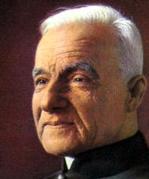i've got sister sharon euart on line one
By Diogenes ( articles ) | Jun 28, 2007
Today is the memorial of St. Irenaeus, who died around the year 203), and my thoughts were carried back to Pope Benedict's excellent catechesis on Irenaeus given last March. While it's worth re-reading in its entirety, the following summary points are particularly striking. The Pope is speaking of Irenaeus as a theologian and an expositor of Church doctrine:
a) The Apostolic Tradition is "public," not private or secret. For Irenaeus, there is no doubt that the content of the faith transmitted by the Church is that received from the apostles and from Jesus, the Son of God. There is no teaching aside from this. Therefore, for one who wishes to know the true doctrine, it is enough to know "the Tradition that comes from the Apostles and the faith announced to men": tradition and faith that "have reached us through the succession of bishops" (Against Heresies 3,3,3-4). Thus, the succession of bishops, personal principle, Apostolic Tradition, and doctrinal principle all coincide.
Why is this important? Among other reasons, because the public nature of the faith protects the faithful from frauds aimed at them by purveyors of a false gospel, whether they be bogus mystics or prophets or revolutionaries. Christian faith is not something whispered in code to initiates, or attainable while in an ecstatic frenzy, or biologically restricted to Aryans (or women, or the descendants of the eighth avatar), but is "proclaimed from the housetops."
b) The Apostolic Tradition is "one." While gnosticism is divided into many sects, the Church's Tradition is one in its fundamental contents, which -- as we have seen -- Irenaeus calls "the rule of faith" or "the rule of truth." And given that it is one, it creates unity among peoples, different cultures and different communities. It has a common content like that of truth, despite different languages and cultures.
Note how this flips contemporary sentimentalisms about "diversity" on their head. If a man tells you he's a Unitarian (where anything goes doctrinally), you can accurately guess his race, income, social class, and how he voted for the past fifteen years. If you know nothing more about a man than that he's Catholic, you have no confidence about any of the above. The greater the insistence on doctrinal unity, the greater possibility for authentic diversity.
c) Finally, the Apostolic Tradition is, as he says in Greek, the language in which he wrote his book, "pneumatic," that is, spiritual, led by the Holy Spirit. In Greek, spirit is "pneuma." It is not a transmission entrusted to the abilities of more or less educated men, but the Spirit of God who guarantees faithfulness in the transmission of the faith.
Absolutely key. Irenaeus was no proto-Lollard, contemptuous of book-learning. Pope Benedict contends, on the contrary, that Irenaeus was the first systematic theologian. But the content of the faith is not something vouchsafed to the professoriat in preference to the simple, and those academics who would have us abandon inherited belief in favor of a theoretically superior novelty are scamming the faithful. Note too that the Spirit does not simply assist the Church in the articulation of true doctrine, but assists the individual Christian in adhering to it. A theologian is as likely as a waitress to be an apostate. A stable hand is as likely as a bishop to die a martyr.
All comments are moderated. To lighten our editing burden, only current donors are allowed to Sound Off. If you are a current donor, log in to see the comment form; otherwise please support our work, and Sound Off!







